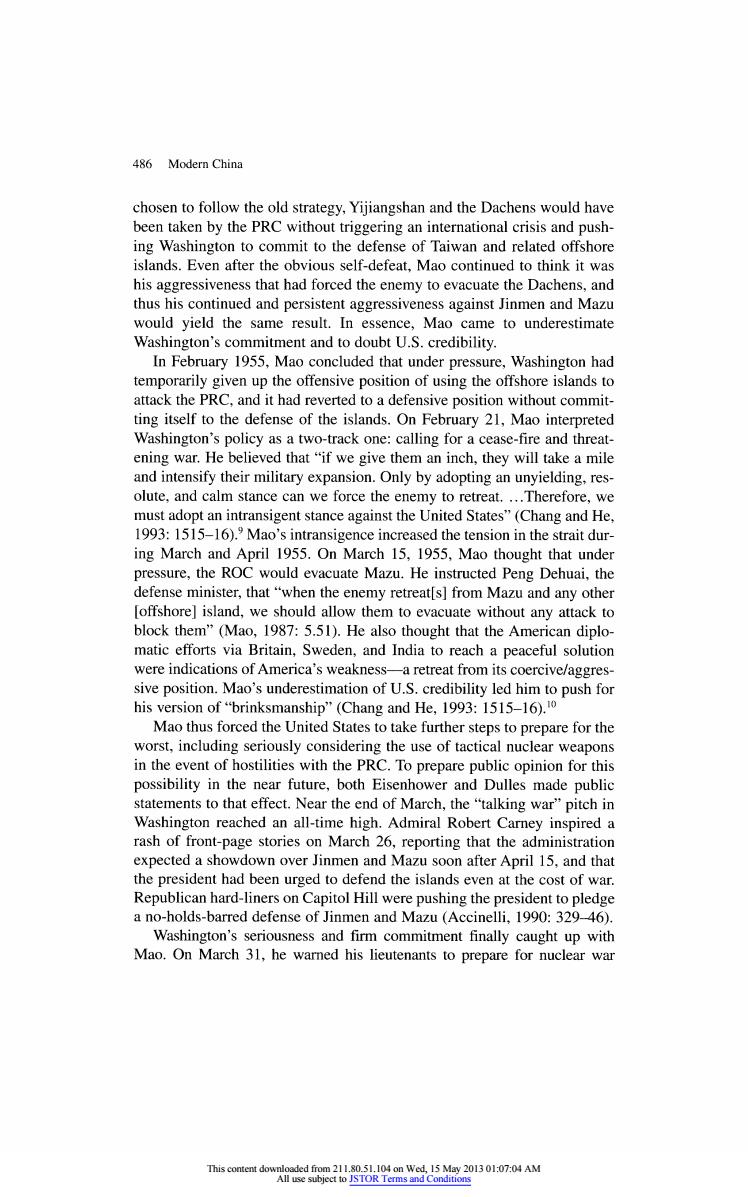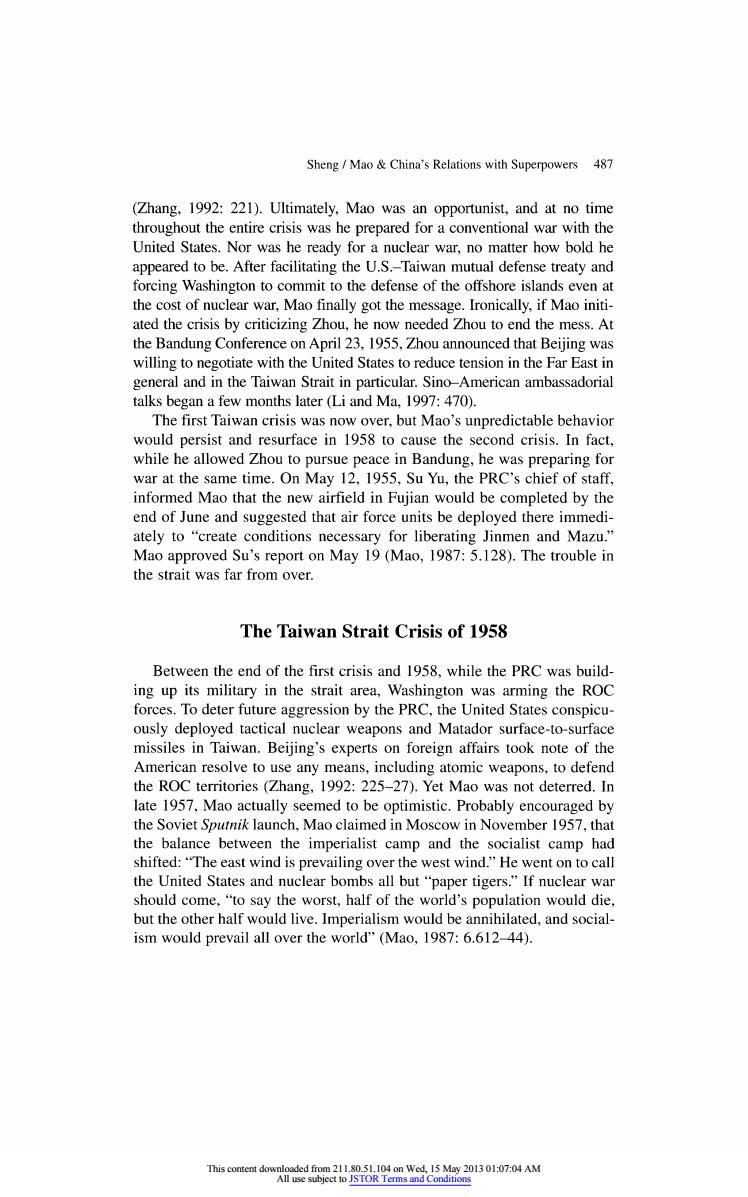
486 Modern China chosen to follow the old strategy,Yijiangshan and the Dachens would have been taken by the PRC without triggering an international crisis and push- ing Washington to commit to the defense of Taiwan and related offshore islands.Even after the obvious self-defeat,Mao continued to think it was his aggressiveness that had forced the enemy to evacuate the Dachens,and thus his continued and persistent aggressiveness against Jinmen and Mazu would yield the same result.In essence,Mao came to underestimate Washington's commitment and to doubt U.S.credibility. In February 1955,Mao concluded that under pressure,Washington had temporarily given up the offensive position of using the offshore islands to attack the PRC,and it had reverted to a defensive position without commit- ting itself to the defense of the islands.On February 21,Mao interpreted Washington's policy as a two-track one:calling for a cease-fire and threat- ening war.He believed that"if we give them an inch.they will take a mile and intensify their military expansion.Only by adopting an unyielding,res- olute,and calm stance can we force the enemy to retreat....Therefore,we must adopt an intransigent stance against the United States"(Chang and He, 1993:1515-16).Mao's intransigence increased the tension in the strait dur- ing March and April 1955.On March 15,1955,Mao thought that under pressure,the ROC would evacuate Mazu.He instructed Peng Dehuai,the defense minister,that "when the enemy retreat[s]from Mazu and any other [offshore]island,we should allow them to evacuate without any attack to block them"(Mao,1987:5.51).He also thought that the American diplo- matic efforts via Britain,Sweden,and India to reach a peaceful solution were indications of America's weakness-a retreat from its coercive/aggres- sive position.Mao's underestimation of U.S.credibility led him to push for his version of "brinksmanship"(Chang and He,1993:1515-16).10 Mao thus forced the United States to take further steps to prepare for the worst,including seriously considering the use of tactical nuclear weapons in the event of hostilities with the PRC.To prepare public opinion for this possibility in the near future,both Eisenhower and Dulles made public statements to that effect.Near the end of March,the "talking war"pitch in Washington reached an all-time high.Admiral Robert Carney inspired a rash of front-page stories on March 26,reporting that the administration expected a showdown over Jinmen and Mazu soon after April 15,and that the president had been urged to defend the islands even at the cost of war. Republican hard-liners on Capitol Hill were pushing the president to pledge a no-holds-barred defense of Jinmen and Mazu (Accinelli.1990:329-46). Washington's seriousness and firm commitment finally caught up with Mao.On March 31,he warned his lieutenants to prepare for nuclear war This content downloaded from 211.80.51.104 on Wed,15 May 2013 01:07:04 AM All use subject to JSTOR Terms and Conditions
486 Modern China chosen to follow the old strategy, Yijiangshan and the Dachens would have been taken by the PRC without triggering an international crisis and push ing Washington to commit to the defense of Taiwan and related offshore islands. Even after the obvious self-defeat, Mao continued to think it was his aggressiveness that had forced the enemy to evacuate the Dachens, and thus his continued and persistent aggressiveness against Jinmen and Mazu would yield the same result. In essence, Mao came to underestimate Washington's commitment and to doubt U.S. credibility. In February 1955, Mao concluded that under pressure, Washington had temporarily given up the offensive position of using the offshore islands to attack the PRC, and it had reverted to a defensive position without commit ting itself to the defense of the islands. On February 21, Mao interpreted Washington's policy as a two-track one: calling for a cease-fire and threat ening war. He believed that "if we give them an inch, they will take a mile and intensify their military expansion. Only by adopting an unyielding, res olute, and calm stance can we force the enemy to retreat. .. .Therefore, we must adopt an intransigent stance against the United States" (Chang and He, 1993: 1515-16).9 Mao's intransigence increased the tension in the strait dur ing March and April 1955. On March 15, 1955, Mao thought that under pressure, the ROC would evacuate Mazu. He instructed Peng Dehuai, the defense minister, that "when the enemy retreat[s] from Mazu and any other [offshore] island, we should allow them to evacuate without any attack to block them" (Mao, 1987: 5.51). He also thought that the American diplo matic efforts via Britain, Sweden, and India to reach a peaceful solution were indications of America's weakness?a retreat from its coercive/aggres sive position. Mao's underestimation of U.S. credibility led him to push for his version of "brinksmanship" (Chang and He, 1993: 1515-16).10 Mao thus forced the United States to take further steps to prepare for the worst, including seriously considering the use of tactical nuclear weapons in the event of hostilities with the PRC. To prepare public opinion for this possibility in the near future, both Eisenhower and Dulles made public statements to that effect. Near the end of March, the "talking war" pitch in Washington reached an all-time high. Admiral Robert Carney inspired a rash of front-page stories on March 26, reporting that the administration expected a showdown over Jinmen and Mazu soon after April 15, and that the president had been urged to defend the islands even at the cost of war. Republican hard-liners on Capitol Hill were pushing the president to pledge a no-holds-barred defense of Jinmen and Mazu (Accinelli, 1990: 329-46). Washington's seriousness and firm commitment finally caught up with Mao. On March 31, he warned his lieutenants to prepare for nuclear war This content downloaded from 211.80.51.104 on Wed, 15 May 2013 01:07:04 AM All use subject to JSTOR Terms and Conditions

Sheng /Mao China's Relations with Superpowers 487 (Zhang,1992:221).Ultimately,Mao was an opportunist,and at no time throughout the entire crisis was he prepared for a conventional war with the United States.Nor was he ready for a nuclear war,no matter how bold he appeared to be.After facilitating the U.S.-Taiwan mutual defense treaty and forcing Washington to commit to the defense of the offshore islands even at the cost of nuclear war,Mao finally got the message.Ironically,if Mao initi- ated the crisis by criticizing Zhou,he now needed Zhou to end the mess.At the Bandung Conference on April 23,1955,Zhou announced that Beijing was willing to negotiate with the United States to reduce tension in the Far East in general and in the Taiwan Strait in particular.Sino-American ambassadorial talks began a few months later (Li and Ma,1997:470). The first Taiwan crisis was now over,but Mao's unpredictable behavior would persist and resurface in 1958 to cause the second crisis.In fact, while he allowed Zhou to pursue peace in Bandung,he was preparing for war at the same time.On May 12,1955,Su Yu,the PRC's chief of staff, informed Mao that the new airfield in Fujian would be completed by the end of June and suggested that air force units be deployed there immedi- ately to "create conditions necessary for liberating Jinmen and Mazu." Mao approved Su's report on May 19(Mao,1987:5.128).The trouble in the strait was far from over. The Taiwan Strait Crisis of 1958 Between the end of the first crisis and 1958,while the PRC was build- ing up its military in the strait area,Washington was arming the ROC forces.To deter future aggression by the PRC,the United States conspicu- ously deployed tactical nuclear weapons and Matador surface-to-surface missiles in Taiwan.Beijing's experts on foreign affairs took note of the American resolve to use any means,including atomic weapons,to defend the ROC territories (Zhang,1992:225-27).Yet Mao was not deterred.In late 1957,Mao actually seemed to be optimistic.Probably encouraged by the Soviet Sputnik launch.Mao claimed in Moscow in November 1957.that the balance between the imperialist camp and the socialist camp had shifted:"The east wind is prevailing over the west wind."He went on to call the United States and nuclear bombs all but"paper tigers."If nuclear war should come,"to say the worst,half of the world's population would die, but the other half would live.Imperialism would be annihilated,and social- ism would prevail all over the world"(Mao,1987:6.612-44). This content downloaded from 211.80.51.104 on Wed,15 May 2013 01:07:04 AM All use subject to JSTOR Terms and Conditions
Sheng / Mao & China's Relations with Superpowers 487 (Zhang, 1992: 221). Ultimately, Mao was an opportunist, and at no time throughout the entire crisis was he prepared for a conventional war with the United States. Nor was he ready for a nuclear war, no matter how bold he appeared to be. After facilitating the U.S.-Taiwan mutual defense treaty and forcing Washington to commit to the defense of the offshore islands even at the cost of nuclear war, Mao finally got the message. Ironically, if Mao initi ated the crisis by criticizing Zhou, he now needed Zhou to end the mess. At the Bandung Conference on April 23, 1955, Zhou announced that Beijing was willing to negotiate with the United States to reduce tension in the Far East in general and in the Taiwan Strait in particular. Sino-American ambassadorial talks began a few months later (Li and Ma, 1997: 470). The first Taiwan crisis was now over, but Mao's unpredictable behavior would persist and resurface in 1958 to cause the second crisis. In fact, while he allowed Zhou to pursue peace in Bandung, he was preparing for war at the same time. On May 12, 1955, Su Yu, the PRC's chief of staff, informed Mao that the new airfield in Fujian would be completed by the end of June and suggested that air force units be deployed there immedi ately to "create conditions necessary for liberating Jinmen and Mazu." Mao approved Su's report on May 19 (Mao, 1987: 5.128). The trouble in the strait was far from over. The Taiwan Strait Crisis of 1958 Between the end of the first crisis and 1958, while the PRC was build ing up its military in the strait area, Washington was arming the ROC forces. To deter future aggression by the PRC, the United States conspicu ously deployed tactical nuclear weapons and Matador surface-to-surface missiles in Taiwan. Beijing's experts on foreign affairs took note of the American resolve to use any means, including atomic weapons, to defend the ROC territories (Zhang, 1992: 225-27). Yet Mao was not deterred. In late 1957, Mao actually seemed to be optimistic. Probably encouraged by the Soviet Sputnik launch, Mao claimed in Moscow in November 1957, that the balance between the imperialist camp and the socialist camp had shifted: "The east wind is prevailing over the west wind." He went on to call the United States and nuclear bombs all but "paper tigers." If nuclear war should come, "to say the worst, half of the world's population would die, but the other half would live. Imperialism would be annihilated, and social ism would prevail all over the world" (Mao, 1987: 6.612-44). This content downloaded from 211.80.51.104 on Wed, 15 May 2013 01:07:04 AM All use subject to JSTOR Terms and Conditions